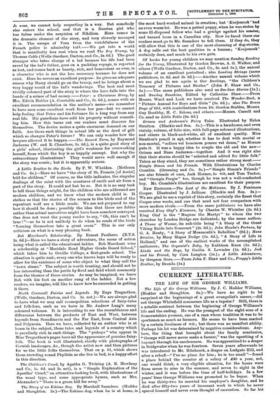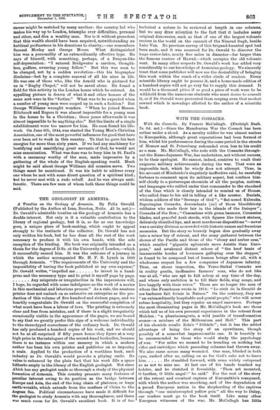C tIRRENT LITE RAT Ult.&
THE LIFE OF SIR GEORGE WILLIAMS.
The Life of Sir George Williams. By J. C. Hodder Williams, (Hodder and Stoughton. 6s.)-We have no right to be surprised at the beginnings of a great evangelist's career,-did not George Whitefleld commence life as a t,apster ? Still, there is a notable contrast between the beginning of George Williams's life and the ending. He was the youngest of the eight sons of a Somersetshire yeoman, one of a race whose tradition it was to be sportsmen as much as farmers. He seems to have been marked by a certain liveliness of wit ; but there was no manifest ability, Perhaps his lot was determined by negative considerations. Any- how, the thing that brought about the family conclusion, "George will never never make a farmer," was the upsetting of a haycart through his carelessness. He was apprenticed to a draper in Bridgwater when he was fourteen. Seven years afterwards he was introduced to Mr. Hitchcock, a draper on Ludgate Hill, and after a rebuff-" I've no place for him ; he is too small "-found a place behind the counter at a salary of 440 a year, not, one would think, a very eligible situation, for the hours were from seven to nine in the summer, and seven to eight in the winter, and it was before the time of half-holidays. In a few years' time George Williams was promoted to be buyer. When he was thirty-two he married his employer's daughter, and he died after fifty-two years of incessant work in which he never spared himself and never even thought of recreation. So far his career might be matched by many another: the country lad who makes his way up to London, triumphs over difficulties, personal and other, and dies a wealthy man. Nor is it without precedent that this wealth should have been atquired, notwithstanding an habitual profuseness in his donations to charity,—one remembers Samuel Morley and George Moore. What distinguished him was a personality of an extraordinarily effective type. Ile says of himself, with something, perhaps, of a Bunyan-like self-depreciation : "I entered Bridgwater a careless, thought- less, godless, swearing young fellow." But this was soon to be changed, not by a sudden revolution—this his biographer disclaims—but by a complete renewal of all his aims in life. He was one of those who, like the Arnold who is pictured for us in "Rugby Chapel," will not be saved alone. He found a field for this activity in the London house which he entered. An appalling picture is drawn of what it and other houses of the same sort were in the "forties." What was to be expected when a number of young men were cooped up in such a fashion ? But George Williams wrought wonders. "When he joined Messrs. Hitchcock and Rogers it was almost impossible for a young man In the house to be a Christian ; three years afterwards it was almost impossible to be anything else." But the limits of a single establishment were too narrow for him. He soon found his life- work. On June 6th, 1844, was started the Young Men's Christian Association, one of the most powerful influences for good that have ever been set to work in this country. To that he gave his beat energies for more than sixty years. If we had any machinery for beatifying and sanctifying great servants of God, he would not miss canonisation. What was done was to bury him in St. Paul's with a ceremony worthy of the man, made impressive by a gathering of the whole of the English-speaking world. Much might be said about George Williams did occasion serve. Two things must be mentioned. It was his habit to address every one whom he met with some direct question of a spiritual kind ; but he never met with a rude rebuff. And he was always anti- fanatic. There are few men of whom both these things could be laid.































































 Previous page
Previous page